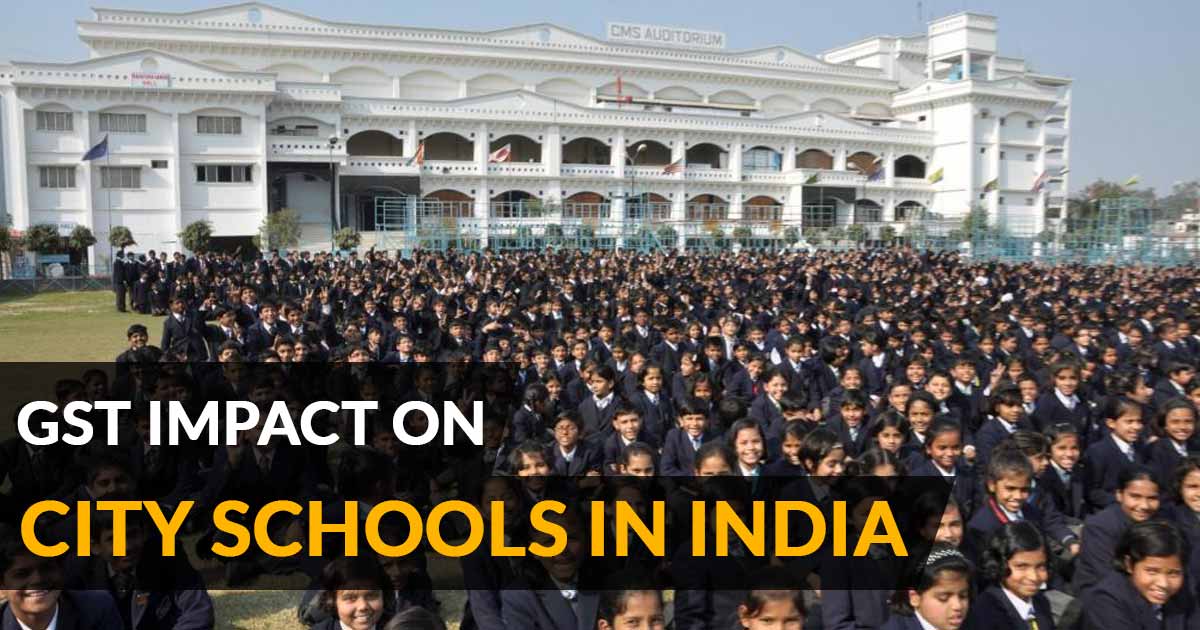In the metropolitan cities, Private Schools have bypassed government schools to become the first choice of parents when it comes to their child’s education over the last couple of years. When GST was being framed, many feared that it would increase the cost of education and thereby burdening parents who would have to incur the extra cost. However, a major relief came to one and all when GST provisions which came into effect on July 1st, 2017 exempted educational institutes as well as education-related services. This made city schools exempt from GST. But this doesn’t give an accurate account of the entire picture. In this blog, we look at some of the current grievances of City Schools and how school administrations are managing increased maintenance costs post one year of GST implementation.
The Indirect Impact
India’s new indirect tax regime has indirectly impacted GST. One year post GST there are now concerns about the extra operational and maintenance costs that school administrations have to incur. While the overall cost of running school operations has increased, the Fee Regulation Act 2016 prohibits fee hikes. Even if the Fee Regulation Act was not in place, most school administration would have refrained from fees hikes under the current circumstances.
Although GST is not levied on educational institutions, in order to maintain the standard level of services as well as at times improvement of existing infrastructure attracts GST. This extra cost is not compensated. School administration complain that the purchase of commodities varies significantly in the category. Additionally, the increase in the price of certain items has impacted running costs. This is reflected in overall annual expenditure in new construction, repairs, and salaries.
GST Impact on School Canteens
This is another area of concern for some if not all school authorities. Especially trustee schools fear that with limited budget allocations, the canteens could be at the receiving end of things. However, this is not a common scenario. Aside from a few schools, most canteen owners have played down the impact on a handful of products like packed food. Some contractors expressed concern about the pressure to meet guidelines of non-increment in canteen charges. Though this is not the case with university hostels where the GST impact is clearly visible.
Read Also: Goods and Services Tax Impact on Education Sector in India
Punjab University has already levied 5% GST on the hostel mess food. Some claim that this could shoot monthly charges by Rs 300 per month. The Students for Society (SFS) also had a silent protest in this regard.
The Private Coaching Institutes
Slowly but surely Private Coaching institutes have overshadowed Private and Government Schools in terms of both standard and faculty. To say that Private Coaching Institutes have become the backbone of Indian Education System would be an understatement. But these institutes fall within the GST ambit. This means that a fees hike in these institutes was imminent. This would ultimately trickle down on the parents. The poor parents will bear the extra costs of coaching. Reportedly, as compared to earlier 15%, the GST levied on coaching institutes is now 18%. An increase of 3% can be a significant dent in common man’s pockets.
The Miscellaneous Effect
We must also take into account the increased transportation cost (Fuel price is at an all-time high) which will definitely impact the household budgets. Last but not the least School supplies ranging from notebooks to craft stationery attract 12-18% GST. This will significantly impact parents and students considering the fact that these were taxed at 5 per cent during the pre-GST era.
Conclusion: In conclusion, we can say that although the GST will increase the reach of the formal sector, its short-term impact on increased education cost (both direct and indirect) cannot be ignored. Some rebate could be a positive step forward in reducing the impact on parents who are already burdened by the rising costs for services and consumer goods. But most importantly, finding a remedy to the ever-increasing importance of private coaching institutes in our educational ecosystem must be on top of Government’s list of priorities in educational reforms.
